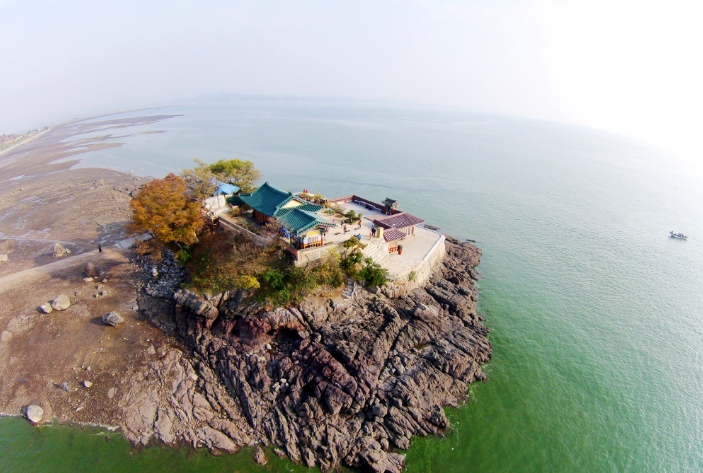 |
An aerial view of Ganwolam in Seosan, South Chungcheon Province (Chungnam Institute of History and Culture) |
Jeong Sin-bo (?-1271), an official who served in the judicature of Southern Song Dynasty, was expelled during the Mongolian invasion as he persisted in his refusal to conform to the new kingdom. This resulted in his political exile, leaving for another country, by himself in his mid-30s, and eventually settling on Ganwol Island in Seosan Province of Goryeo.
Jeong sought to drop the "stranger" tag by teaching Neo-Confucianism to the children of fishermen as well as local notables. Even though Jeong, as a naturalized citizen, is not famous as a Korean scholar, he disseminated Neo-Confucianism about 50 years earlier than An Hyang, who is known for being the first to introduce it.
Jeong’s educational activities were the driving force that enabled him to gradually integrate into the main society of Goryeo, as well as his marriage to a Goryeo woman. In this, Jeong and his son, In-gyeong (1241-1305), eventually became the progenitors of the Seosan Jeong clan. He was also a Goryeo loyalist. It seems largely due to the noblesse oblige of Jeong Sin-bo’s original Pongang Jeong family, and his practical education in Southern Song that the father and son were able to assimilate into mainstream Goryeo society as immigrants.
Despite his 60-odd years, Jeong was in the forefront of national defense at a time when Goryeo was threatened by the Mongols and defeated its army. His son, In-gyeong, also distinguished himself as an interpreter. During the Mongolian invasion, his diplomatic negotiations resulted in the return of prisoners of war and the return of Dongnyeong-bu, a strategic point in the northwestern part of Goryeo.
Such accomplishments were the fruit of his outstanding linguistic ability and international mindset as a naturalized second-generation citizen under the influence of his father, Sin-bo, who accomplished a remarkable feat as a scholarly bureaucrat. Teaching Neo-Confucianism in his second homeland was the pillar of hope that helped him overcome the personal hardships and cultural conflicts as a stranger in the land since Neo-Confucianism, especially its thought of righteousness, took root for generations in both Southern Song and Goryeo.
Cultural conflicts and social inclusion of immigrants are growing issues today while deep-rooted hatred and centuries-old rivalry have worsened crisis around the world. Although small, the number of foreigners applying for naturalization in Korea is steadily increasing every year. The successful naturalization of Jeong Sin-bo and his son, In-gyeong have a lot to teach us.
When Jeong set his first step on this strange land, he did not get frustrated and chose a place where he could live out his convictions as a scholar. The story of his settlement in Goryeo resonates with the people today. It may be worth reflecting on how much the gaze of the other has enriched our culture while watching the sunset from the small temple on Ganwol island.
By Park Jeong-eon (histopia78@gmail.com)
Park Jeong-eon is a senior researcher at Chungnam Institute of History and Culture. -- Ed.







